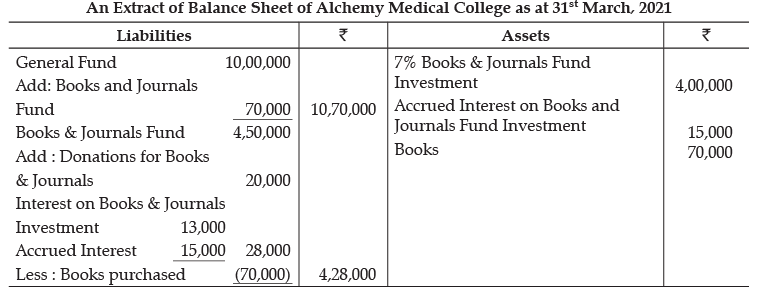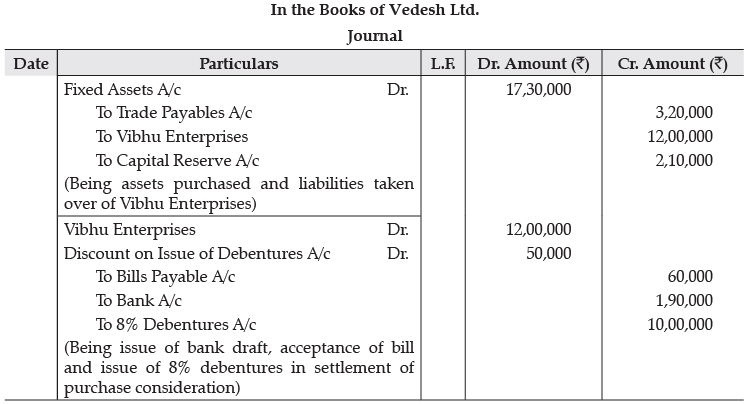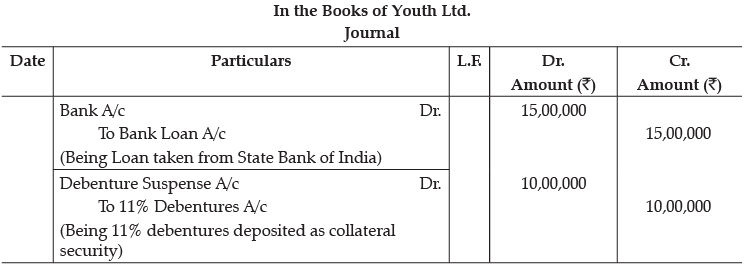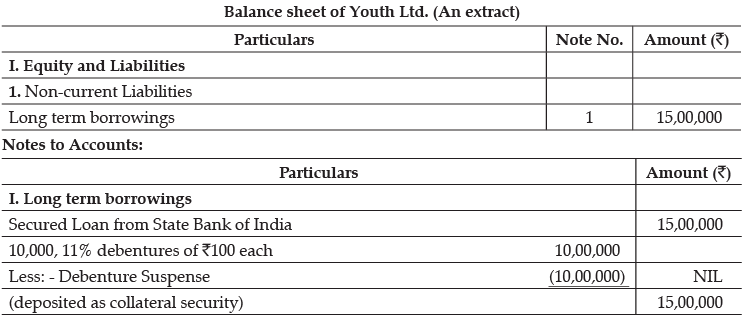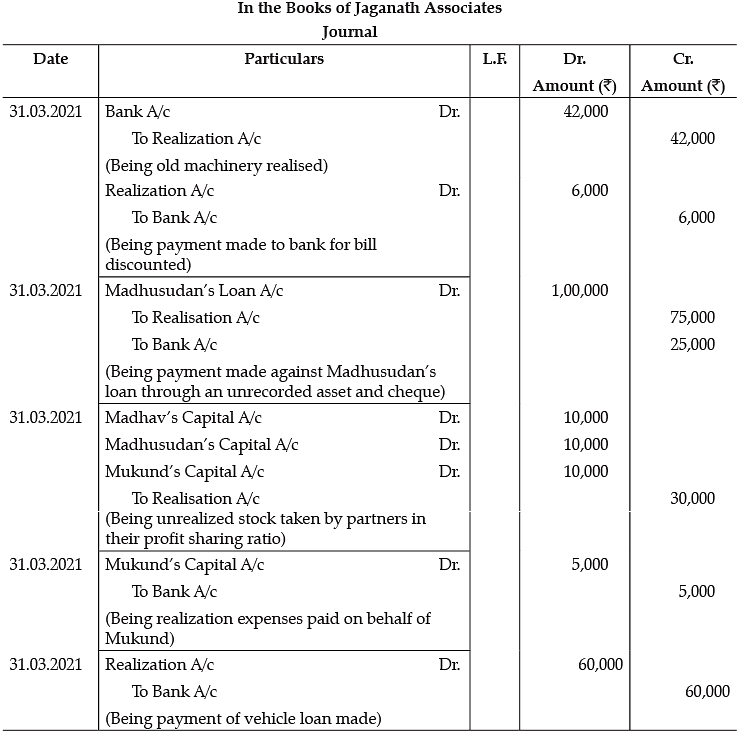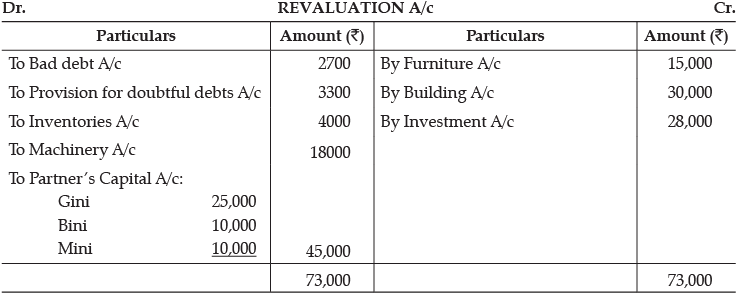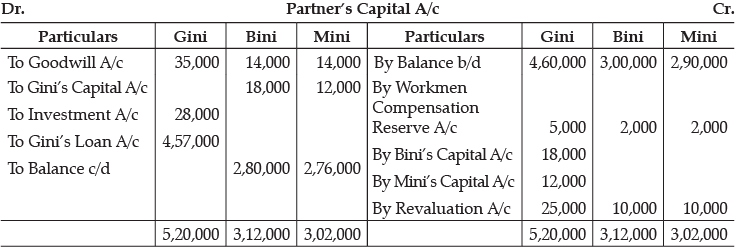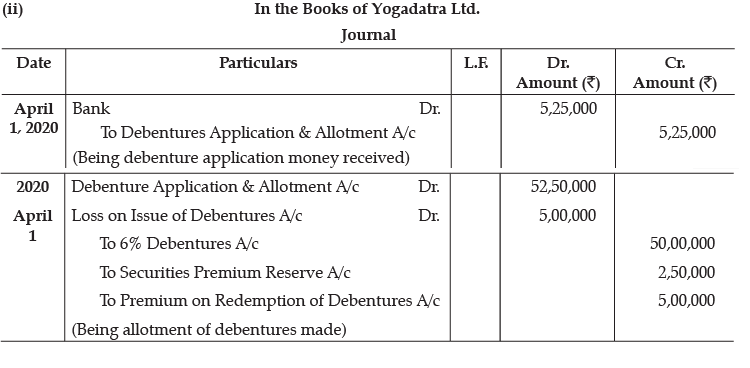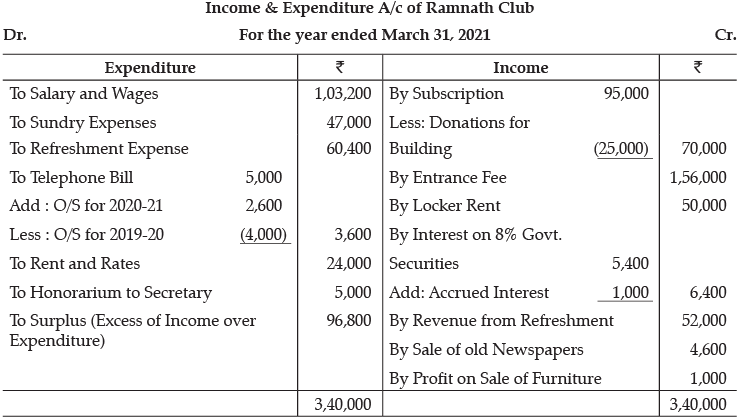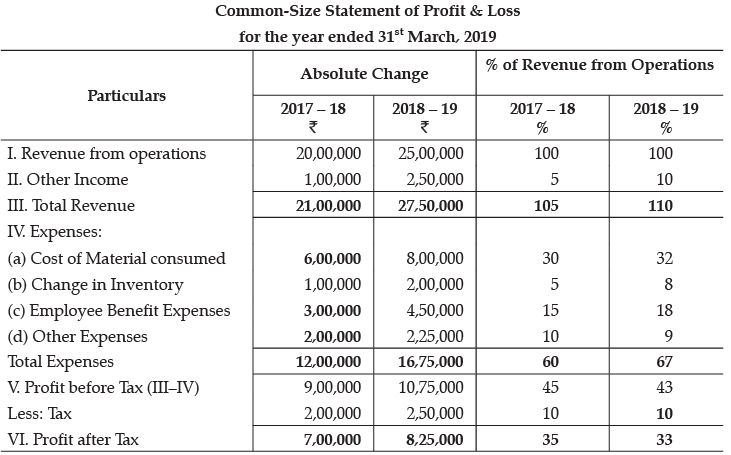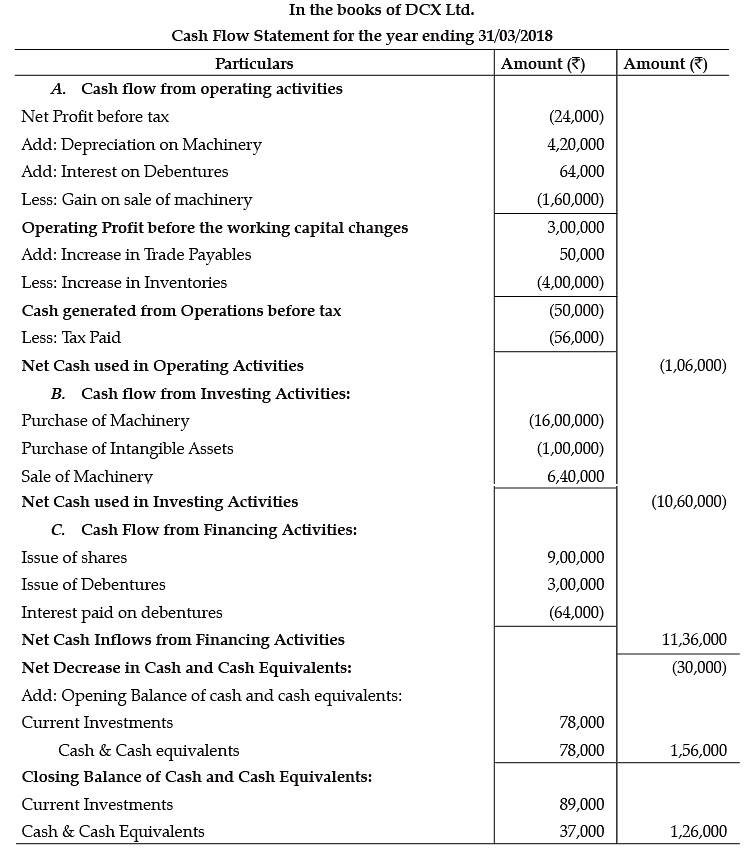Class 12 Accountancy: CBSE Sample Question Papers- Term II (2021-22)- 5 | Sample Papers for Class 12 Commerce PDF Download
Class-XII
Time: 120 Minutes
Max. Marks: 40
General instructions:
Read the following instructions very carefully and strictly follow them:
- This question paper comprises two Parts – A and B. There are 12 questions in the question paper. All questions are compulsory.
- Part-A is compulsory for all candidates.
- Part-B has two options i.e. (i) Analysis of Financial Statements and (ii) Computerized Accounting. Students must attempt only one of the given options.
- Question nos. 1 to 3 and 10 are short answer type–I questions carrying 2 marks each.
- Question nos. 4 to 6 and 11 are short answer type–II questions carrying 3 marks each.
- Question nos. 7 to 9 and 12 are long answer type questions carrying 5 marks each.
- There is no overall choice. However, an internal choice has been provided in 3 questions of three marks and 1 question of five marks.
Part- A

Amount of medicines consumed during the year 2020-21:
Alternative Solution:
Q.2. Distinguish between ‘Dissolution of Partnership’ and ‘Dissolution of Partnership Firm’ based on:
(i) Settlement of assets and liabilities
(ii) Economic relationship.
Q.3. Suresh, Ramesh and Tushar were partners of a firm sharing profits in the ratio of 6 : 5 : 4. Ramesh retired and his capital after making adjustments on account of reserves, revaluation of assets and reassessment of liabilities stood at ₹ 2,50,400. Suresh and Tushar agreed to pay him ₹ 2,90,000 in full settlement of his claim.
Pass necessary journal entry for the treatment of goodwill. Show workings clearly.
Working Note:
Ramesh’s share of Goodwill = ₹ 2,90,000 – ₹ 2,50,400 = ₹39,600
Q.4. From the following information given by Modern Dance Academy, calculate the amount of Subscription received during the year 2020-21.
(i) Subscription credited to Income & Expenditure A/c for the year ending 31st March, 2021 amounted to ₹ 3,00,000 and each member is required to pay an annual subscription of ₹ 3,000.
(ii) Subscription in arrears as on 1st April, 2020 amounted to ₹ 16,000.
(iii) During the year 2020-21, 10 members made partial payment of ₹ 26,000 towards subscription, 8 members failed to pay the subscription amount and 5 members paid the subscription amount for the year 2021-22.
(iv) During the year 2019-20, 12 members paid the subscription amount for the year 2020-21.
Following information is given by Alchemy Medical College, Library department for the year 2020-21.
Show the accounting treatment of the above-mentioned items in the Balance Sheet of the Alchemy Medical College as at 31st March,2021.
Calculation of amount of Subscription received during the year 2020-21 by Modern Dance Academy:
OR
Working Note:
Interest on Books and Journals Investments = 4,00,000 × 7/100 = 28,000
Accrued Interest = 28,000 – 13,000 = ₹ 15,000
Q.5. Harihar, Hemang and Harit were partners with fixed capitals of ₹ 3,00,000, ₹ 2,00,000 & ₹ 1,00,000 respectively. They shared profits in the ratio of their fixed capitals. Harit died on 31st May, 2020, whereas the firm closes its books of accounts on 31st March every year. According to their partnership deed, Harit’s representatives would be entitled to get share in the interim profits of the firm on the basis of sales. Sales and profit for the year 2019-20 amounted to ₹8,00,000 and ₹2,40,000 respectively and sales from 1st April, 2020 to 31st May 2020 amounted to ₹ 1,50,000. The rate of profit to sales remained constant during these two years. You are required to:
(i) Calculate Harit’s share in profit.
(ii) Pass journal entry to record Harit’s share in profit.
Ratio of Profit to sales = 2,40,000/8,00,000 x 100 = 30%
Profit upto the date of death = 1,50,000 × 30% = ₹ 45,000
Profit sharing Ratio = 3 : 2 : 1
Harit’s Share of Profit = 45,000 × 1/6 = ₹ 7,500
Alternative: Harit’s Share of Profit = 2,40,000/8,00,000 x 1,50,000 x 1/6 = ₹ 7,500
Q.6. Vedesh Ltd. purchased a running business of Vibhu Enterprises for a sum of ₹ 12,00,000. Vedesh Ltd. paid ₹ 60,000 by drawing a promissory note in favour of Vibhu Enterprises., ₹ 1,90,000 through bank draft and balance by issue of 8% debentures of ₹ 100 each at a discount of 5%. The assets and liabilities of Vibhu Enterprises consisted of Fixed Assets valued at₹17,30,000 and Trade Payables at ₹ 3,20,000. You are required to pass necessary journal entries in the books of Vedesh Ltd.
Youth Ltd. took a loan of ₹ 15,00,000 from State Bank of India against the security of tangible assets. In addition to principal security, it issued 10,000 11% debentures of ₹ 100 each as collateral security. Pass necessary journal entries for the above transactions, if the company decided to record the issue of 11% debentures as collateral security and show the presentation in the Balance Sheet of Youth Ltd.
Working Note:Number of Debentures issued = 9,50 ,000/95 = 10,000
OR
Q.7. Madhav, Madhusudan and Mukund were partners in Jaganath Associates. They decided to dissolve the firm on 31st March 2021.
Pass necessary journal entries for the following transactions after various assets (other than cash) and third-party liabilities have been transferred to realization account:
(i) Old machine fully written off was sold for ₹ 42,000 while a payment of ₹ 6,000 is made to bank for a bill discounted being dishonoured.
(ii) Madhusudan accepted an unrecorded asset of ₹ 80,000 at ₹ 75,000 and the balance through cheque, against the payment of his loan of ₹ 1,00,000 to the firm.
(iii) Stock of book value of ₹ 30,000 was taken by Madhav, Madhusudan and Mukund in their profit sharing ratio.
(iv) The firm had paid realization expenses amounting to ₹ 5,000 on behalf of Mukund.
(v) There was a vehicle loan of ₹ 2,00,000 which was paid by surrender of asset to the bank at an agreed value of ₹ 1,40,000 and the shortfall was met from firm’s bank account.
Gini, Bini and Mini were in partnership sharing profits and losses in the ratio of 5 : 2 : 2. Their Balance Sheet as at 31st March, 2021 was as follows: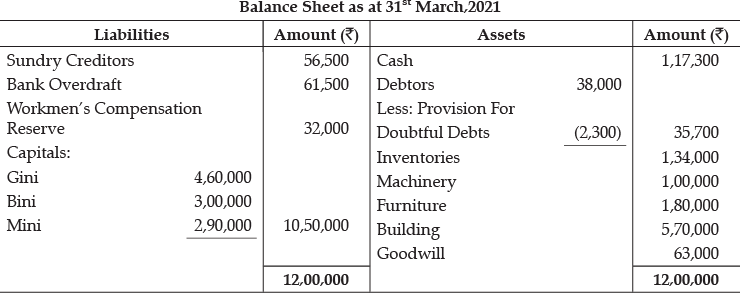
On 31st March, 2021, Gini retired from the firm. All the partners agreed to revalue the assets and liabilities on the following basis:
(i) Bad debts amounted to ₹ 5,000. A provision for doubtful debts was to be maintained at 10% on debtors.
(ii) Partners have decided to write off existing goodwill.
(iii) Goodwill of the firm was valued at ₹ 54,000 and be adjusted into the Capital Accounts of Bini and Mini, who will share profits in future in the ratio of 5:4.
(iv) The assets and liabilities valued as: Inventories ₹ 1,30,000; Machinery ₹ 82,000; Furniture ₹ 1,95,000 and Building ₹ 6,00,000.
(v) Liability of ` 23,000 is to be created on account of Claim for Workmen Compensation.
(vi) There was an unrecorded investment in shares of ₹ 25,000. It was decided to pay off Gini by giving her unrecorded investment in full settlement of her part payment of ₹ 28,000 and remaining amount after two months.
Prepare Revaluation Account and Partners’ Capital Accounts as on 31st March, 2021.
OR
Working Notes:
Goodwill of the firm = 54,000
Calculation of Gaining Ratio:
Gaining Ratio = New profit share – Old profit share
Old Ratio = 5:2:2
New Ratio = 5:4
Bini's Gain = 5/9 - 2/9 = 3/9
Mini's Gain = 4/9 - 2/9 = 2/9
Gini's share of goodwill = 54 000 x 5/9 = 30,000
This share of goodwill will be contributed by Bini and Mini in their gaining ratio, 3:2.
Bini's contribution = 30,000 x 3/5 = 18,000
Mini's contribution = 30,000 x 2/5 = 12,000
(Workmen Compensation Reserve of 23,000 will be credited to workmen compensation claim as a liability and the balance will be credited to partners' capital accounts, which is:
32,000 - 23,000 = 9,000.
Q.8. Yogadatra Ltd. (pharmaceutical company) appointed marketing expert, Mr. Kartikay as the CEO of the company, with a target to penetrate their roots in the rural regions. Mr. Kartikay discussed the ways and means to achieve target of the company with financial, production and marketing departmental heads and asked the finance manager to prepare the budget. After reviewing the suggestions given by all the departmental heads, the finance manager proposed requirement of an additional fund of ₹ 52,50,000.
Yogadatra Ltd. is a zero-debt company. To avail the benefits of financial leverage, the finance manager proposed to include debt in the capital structure. After deliberations on April 1, 2020, the board of directors had decided to issue 6% Debentures of ₹ 100 each to the public at a premium of 5%, redeemable after 5 years at ₹110 per share.
You are required to answer the following questions:
(i) Calculate the number of debentures to be issued to raise additional funds.
(ii) Pass Journal entry for the allotment of debentures.
(iii) Pass Journal entry to write off loss on issue of debentures.
(iv) Calculate the amount of annual fixed obligation associated with debentures.
(v) Prepare Loss on Issue of Debentures Account.
(i) Number of Debentures to be issued = 52,50,000/105 = 50,000
(iv) Interest on 6% debentures = 50,00,000 × 6/100 = ₹ 3,00,000
Q.9. From the following Receipts and Payments Account and additional information provided by Ramanath Club, Prepare Income and Expenditure Account for the year ending on 31st March 2021.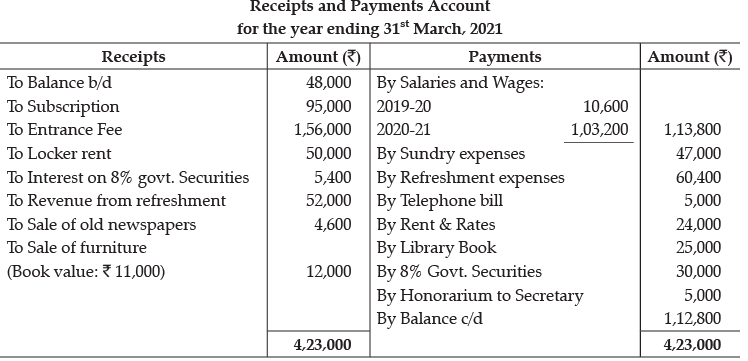
Additional Information:
(i) Subscription received during the year includes ₹ 25,000 as donation for Building.
(ii) Telephone bill unpaid as on March 31, 2020 was ₹ 4,000 and on March 31, 2021 ₹ 2,600.
(iii) Value of 8% Government Securities on March 31, 2020 was ₹ 80,000.
(iv) Additional Government Securities worth ₹ 30,000 were purchased on March 31, 2021.
Part- B
Q.10. State whether the following will result into cash inflow or outflow:
(i) Purchase of Machinery
(ii) Issue of Shares
(i) Cash outflow as the money will go out from the firm to purchase the machinery.
(ii) Cash inflow as when the shares are issued it will result in cash to be pumped into the company.
Q.11. Fill in the amounts left blank in the following Common-Size Statement of Profit and Loss for the year ended 31st March, 2019: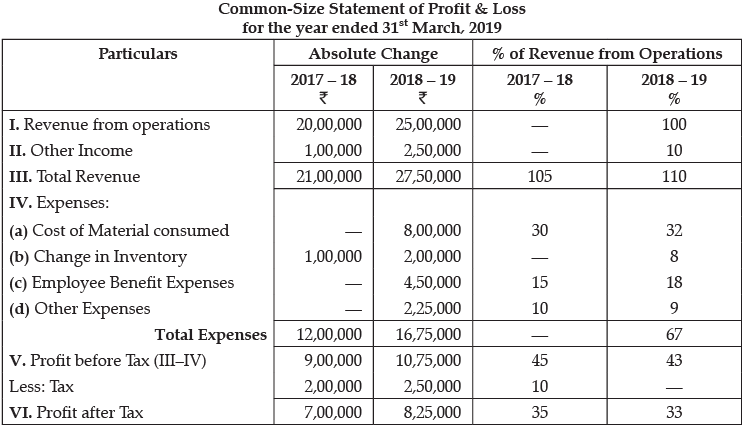
Explain the tools of Financial Statement analysis.
ORTwo main tools of Financial Statement analysis are:
(i) Comparative Statements: Comparative Statements deal with the comparison of different items of the Profit and Loss account and Balance Sheets of two or more periods. As a rule, a financial statement can be presented in the form of comparative statement such as comparative Balance sheet, comparative profit and loss account, etc.
(ii) Comparative Income Statement: Comparative Income Statement provides three important information: Gross Profit, Operating Profit and Net Profit. The changes or improvement in the profitability of the business is found out over a period of time. If the changes are not satisfactory, the management can find out the reasons for it and some corrective action can be taken.
Q.12. From the following Balance Sheet of DCX Ltd. and the additional information as at 31st March, 2018 prepare a Cash Flow Statement: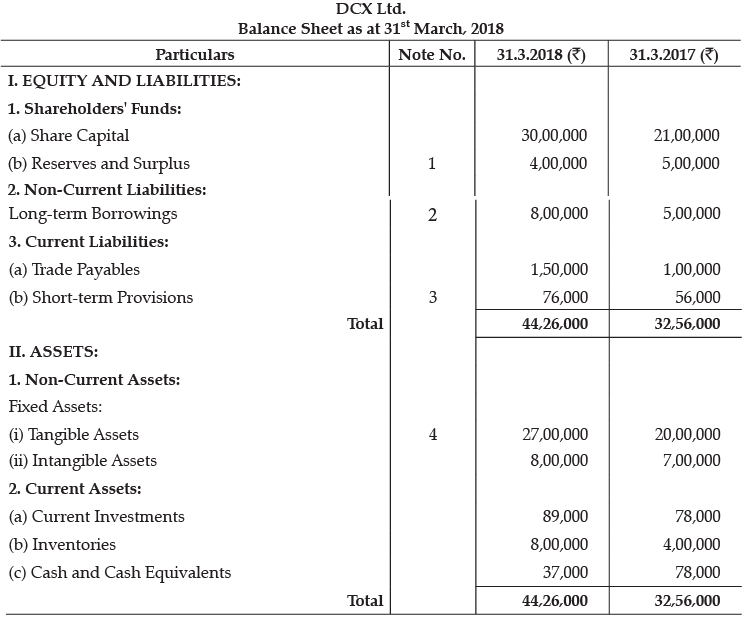
Notes to Accounts: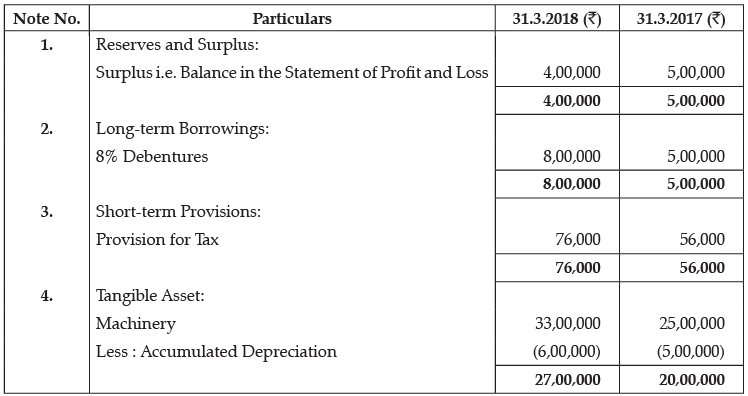
Additional Information:
During the year, a machinery costing ₹ 8,00,000 on which accumulated depreciation was ₹ 3,20,000 was sold for ₹ 6,40,000.
Debentures were issued on 1st April, 2017.
Working Notes:
|
130 docs|5 tests
|
FAQs on Class 12 Accountancy: CBSE Sample Question Papers- Term II (2021-22)- 5 - Sample Papers for Class 12 Commerce
| 1. What is the duration of Class 12 Accountancy exam? |  |
| 2. How many marks is the Class 12 Accountancy exam worth? |  |
| 3. What are the two parts of the Class 12 Accountancy exam? |  |
| 4. How many questions are there in Part A of the Class 12 Accountancy exam? |  |
| 5. What should be the complexity of the questions and answers in the Class 12 Accountancy exam? |  |






